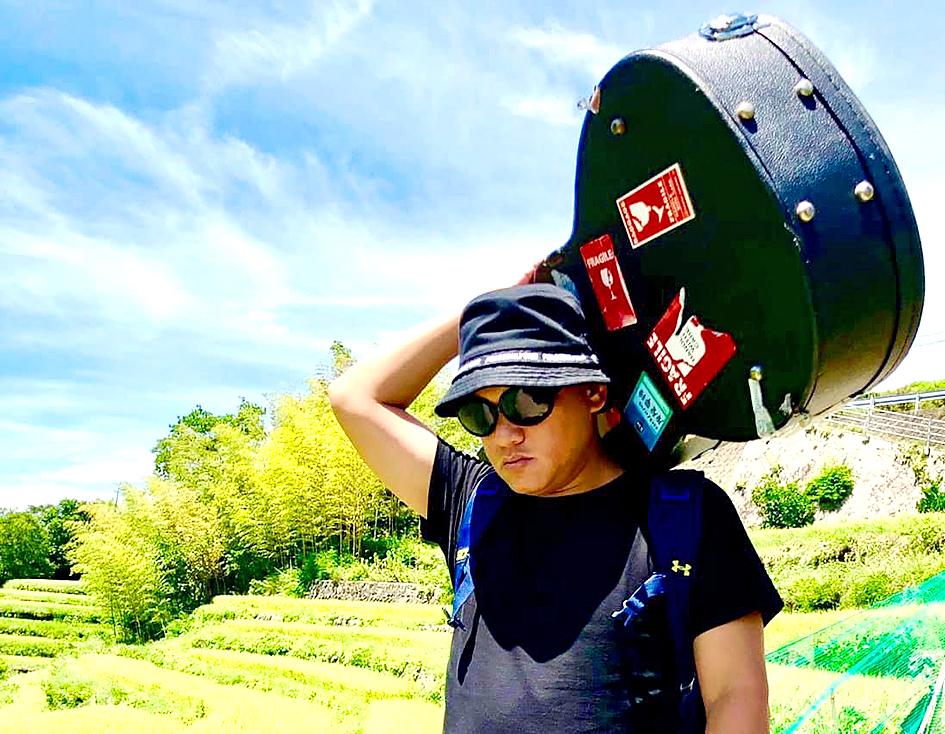It has been four years since Puyuma singer-songwriter Sangpuy Katatepan Mavaliyw released his award-winning album Yaangad (椏幹, Life), but his fans long wait ended yesterday, when he released pulu’em (得力量, Gain Strength).
The release came ahead of a weekend of afternoon concerts at the Cloud Gate Theater in New Taipei City’s Tamsui District (淡水) that his team are calling the “Sangpuy 2020 Cloud Gate Theater Sharing Sessions” (桑布伊2020雲門劇場音樂分享會).
He has had a busy four years in the interval: providing vocals for then-Cloud Gate Dance Theatre (雲門舞集) artistic director Lin Hwai-min (林懷民) 2017 production, Formosa (關於島嶼); touring in Europe; a three-concert run at the National Theater in Taipei in April last year as part of the Taiwan International Festival of Arts; helping his mother in the family’s orchard, and of course, working on new songs.

Photo courtesy of Cloud Gate Theater
That was in addition to picking up three awards at the 2017 Golden Melody Awards for Yaangad, including — in an historic win for an Aboriginal artist — Best Album of the Year, as well as his second Best Aboriginal Singer trophy — the first was for 2012’s Dalan (路, Road).
The Taitung County native told a news conference in Taipei on Tuesday that one of the benefits of having some of this year’s tour dates in Europe canceled because of the COVID-19 pandemic was that it gave him more time to work on pulu’em, the first album he has coproduced.
Collaborations with several Taiwanese musicians and arrangers led him into some new musical directions, he said, while meeting Belgian violinist-composer Wouter Vandenabeele and Senagalese musician Bao Sissoko, two members of the trio Tamala, at a music festival in Belgium last year, ended up with them working on one of his new songs, A Day in the Life (一天的生活).

Photo courtesy of Cloud Gate Theater
Some of the 10 songs on pulu’em — which means gaining strength and being blessed in the Puyuama language — will be featured at this weekend’s shows, as well as favorites from his first two albums and a few traditional Pinuyumayan songs.
Backing him up on stage will be long-time collaborators on stage and in the studio, Tseng Jen-yi (曾仁義, Nine G) and keyboardist Hong Tzu-long (洪子龍), as well as guitarist Kuo Yi-hao (郭一豪), bass player Jiang Lee-ping (江力平), percussionist Alex Wu (吳政君), drummer James Shen (沈威成), and a three-man chorus made up of members of the Taitung-based Bulareyaung Dance Company (布拉瑞揚舞團) — Ponay Ngangiwan, Siyang Sawawa and Morikilr.
However, once Sangpuy’s shows inside the theater are finished, the fun is set to continue on the lawn outside, with a music and dance performance by the Indigenous Youth Ensemble of Jin-Shan High School (金山高中原民青年團隊), and a chance for audience members to try some traditional Aboriginal food.
Cloud Gate Theater said a limited number of Aboriginal-style meals will be provided free to ticketholders — while supplies last — and beverages can be purchased from vendors or audience members can bring their own.
However, those who plan on sampling the food should bring their own utensils and napkins, the theater said.

Last week Joseph Nye, the well-known China scholar, wrote on the Australian Strategic Policy Institute’s website about how war over Taiwan might be averted. He noted that years ago he was on a team that met with then-president Chen Shui-bian (陳水扁), “whose previous ‘unofficial’ visit to the US had caused a crisis in which China fired missiles into the sea and the US deployed carriers off the coast of Taiwan.” Yes, that’s right, mighty Chen caused that crisis all by himself. Neither the US nor the People’s Republic of China (PRC) exercised any agency. Nye then nostalgically invoked the comical specter

April 15 to April 21 Yang Kui (楊逵) was horrified as he drove past trucks, oxcarts and trolleys loaded with coffins on his way to Tuntzechiao (屯子腳), which he heard had been completely destroyed. The friend he came to check on was safe, but most residents were suffering in the town hit the hardest by the 7.1-magnitude Hsinchu-Taichung Earthquake on April 21, 1935. It remains the deadliest in Taiwan’s recorded history, claiming around 3,300 lives and injuring nearly 12,000. The disaster completely flattened roughly 18,000 houses and damaged countless more. The social activist and

Over the course of former President Ma Ying-jeou’s (馬英九) 11-day trip to China that included a meeting with Chinese Communist Party (CCP) leader Xi Jinping (習近平) a surprising number of people commented that the former president was now “irrelevant.” Upon reflection, it became apparent that these comments were coming from pro-Taiwan, pan-green supporters and they were expressing what they hoped was the case, rather than the reality. Ma’s ideology is so pro-China (read: deep blue) and controversial that many in his own Chinese Nationalist Party (KMT) hope he retires quickly, or at least refrains from speaking on some subjects. Regardless

Approaching her mid-30s, Xiong Yidan reckons that most of her friends are on to their second or even third babies. But Xiong has more than a dozen. There is Lucky, the street dog from Bangkok who jumped into a taxi with her and never left. There is Sophie and Ben, sibling geese, who honk from morning to night. Boop and Pan, both goats, are romantically involved. Dumpling the hedgehog enjoys a belly rub from time to time. The list goes on. Xiong nurtures her brood from her 8,000 square meter farm in Chiang Dao, a mountainous district in northern Thailand’s